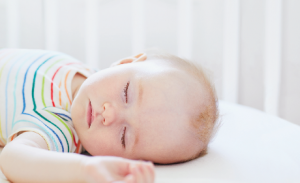Your baby shower brought you lovely nursery decor, the adorable mesh bear you had your eyes on, and Grandma’s special, handmade quilt. Flash forward: Baby’s here, and your pediatrician tells you to put all your treasured “extras” away for now. Umm, why? According to Rachel Fadden R.N., and HEAL coordinator at Premier Health Atrium Medical Center, your baby will be safest — and most comfortable — in a minimal environment.
“Unfortunately, it’s such an exciting time for parents, but they have to help the baby have a safe sleep environment,” says Fadden. “It’s basic; it’s minimal. Baby doesn’t care whether there is a bumper in the crib or not,” she adds.
The safest sleep environment for your new bundle includes a firm mattress with a tight, fitted sheet, no blankets, no stuffed animals, and no loose items or decor.
THINK ABOUT IT
Envision how you like your sleep environment to be — quiet, a pleasant temperature, soft or no light, the sound of a fan running — your baby’s needs are similar, and remember, every baby is different.
“It’s about taking your baby’s natural cues on what makes him happy and trying different things,” suggests Fadden.
When setting up your crib or bassinet, place it somewhere with limited light. Next, Fadden recommends finding a soothing song that seems to work for your baby for comforting ambiance. But noise — white or otherwise — can work wonders for babies, too. Some infants actually prefer a little noise. If you notice they enjoy the sound of the vacuum, let it run!
Also consider your baby’s temperature. Keep your room temps airy and between 68 – 72 degrees. Fadden recommends touching your baby’s hand: if he seems too warm, for example, remove any long sleeves and put him in a onesie and/or sleep sack instead. Finding out what works best for your baby is key, and know that his habits will change as he grows.
“Don’t think your child will always have this routine environment,” says Fadden.
SAFETY FIRST
If you’re thinking that all of this doesn’t apply to you since you plan to co-sleep with your infant, know that the American Academy of Pediatrics recommends room sharing — not bed sharing — up to age 1.
Whatever your decision, checking on your baby regularly (about every two to three hours) and keeping him close by will ensure his safety and ease your mind, too. Some new parents worry a lot about when Baby will sleep through the night, when in fact, deep sleep between 4 to 6 months can actually increase the risk of SIDS. If your baby is older than 6 months and still not sleeping more than two to three hours at a time, or “through the night,” this isn’t exactly a bad thing.
“As a parent, you’re never going to sleep the same way again,” laughs Fadden.
Once your infant is comfortable and safe, try and take advantage of this time to get your rest, too, so you will be rested and be the best you can be for your ‘lil darlin.’





